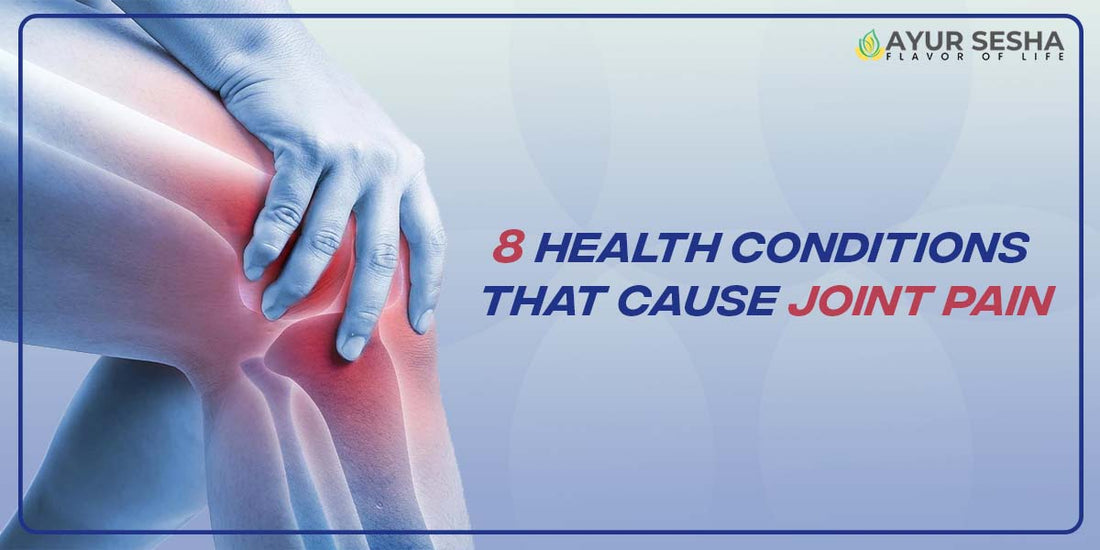
8 Health Conditions That Cause Joint Pain
Share
Are you tired of waking up every morning with aching joints? Joint pain can be a real buzzkill, making even the simplest tasks feel like a Herculean effort. But before you throw in the towel and resign yourself to a life of discomfort, it's important to understand the underlying causes of joint pain. In this blog post, we'll explore eight health conditions that are notorious for causes of joint pain. Let's get started! Grab a cup of coffee, relax, and let's dive in.
Causes Of Joint Pain
1:- Osteoarthritis
Osteoarthritis, also known as degenerative joint disease, is one of the most common culprits behind joint pain. Arthritis is aused by the gradual breakdown of the cartilage that cushions the ends of your bones. This can lead to bone rubbing against bone, causing pain, stiffness, and swelling in the affected joints. Osteoarthritis is a common condition that affects the joints in the knees, hips, hands, and spine
2:- Rheumatoid Arthritis
Unlike osteoarthritis, rheumatoid arthritis is an autoimmune disease. This means that your immune system mistakenly attacks the lining of your joints, causing inflammation and pain. Rheumatoid arthritis often affects multiple joints simultaneously, and the pain can be debilitating. If you notice joint stiffness, swelling, and redness that lasts for more than six weeks, it's time to consult a healthcare professional.
3:- Gout
Gout is a form of arthritis that occurs when uric acid crystals build up in the joints, leading to intense pain and swelling. It commonly affects the big toe, but can also target other joints such as the ankles, knees, wrists, and fingers. Gout attacks often come on suddenly and can be triggered by certain foods, alcohol, and obesity. So if you've been indulging in too much red meat and beer lately, you might want to watch out for those telltale signs of gout.
4:- Lupus
Lupus is a chronic autoimmune disease that can affect various parts of the body, including the joints. Causes of Joint pain and swelling are common symptoms of lupus, and they tend to come and go. The pain is often accompanied by fatigue, fever, and a general feeling of malaise. If you suspect you might have lupus, don't hesitate to seek medical advice.
5:- Fibromyalgia
Fibromyalgia is a complex condition characterized by widespread musculoskeletal pain, fatigue, and tender points. The cause of fibromyalgia is not fully understood, but it is believed to be a combination of genetic and environmental factors. People with fibromyalgia often experience joint pain, stiffness, and muscle aches all over their body. If you're constantly feeling like you've been hit by a truck, fibromyalgia might be the culprit.
6:- Bursitis
Bursitis occurs when the small fluid-filled sacs called bursae, which cushion the bones, muscles, and tendons near the joints, become inflamed. This can lead to joint pain, tenderness, and limited range of motion. Bursitis commonly affects the shoulders, elbows, hips, and knees, and it's often caused by repetitive motions or prolonged pressure on the joints. So take frequent breaks and listen to your body when it tells you to slow down.
7:- Lyme Disease
Lyme disease is a bacterial infection that can be transmitted through the bite of an infected tick. If left untreated, it can spread to the joints, causing severe joint pain and swelling. Other symptoms of Lyme disease include fever, fatigue, and a characteristic bull's-eye rash. If you have recently been in an area where ticks are common and are experiencing joint pain, it is important to see a doctor to get tested for Lyme disease.
8:- Osteoporosis
Osteoporosis is a condition that causes bones to become weak and brittle, increasing the risk of fractures. While osteoporosis itself doesn't cause joint pain, fractures resulting from weakened bones can lead to joint pain and limited mobility. If you're experiencing joint pain along with a history of fractures or if you're at risk for osteoporosis, it's crucial to discuss your symptoms with a healthcare professional.
Now that you're armed with knowledge about these eight health conditions that can cause joint pain, you can take the next step towards finding relief. Remember, early detection and proper management are key to minimizing joint pain and maintaining a good quality of life. So don't hesitate to reach out to a healthcare professional if you're experiencing persistent joint pain. Your joints will thank you!

